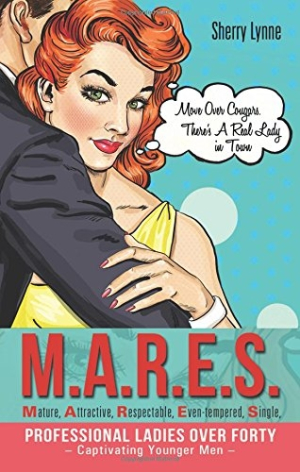
M.A.R.E.S.: Mature, Attractive, Respectable, Even-Tempered, Single, Professional Ladies Over Forty
Captivating Younger Men
Lynne’s tone is feminine, relatable, and friendly, and she states her points with humor.
Ever since Anne Bancroft set the screen on fire in The Graduate, our culture has had a fascination with cougars. Defined as a woman, usually in her forties or older, who pursues sexual relationships with significantly younger men, the “cougar” inspires envy, excitement, and derision. M.A.R.E.S.: Mature, Attractive, Respectable, Even-Tempered, Single, Professional Ladies Over Forty works to reclaim and rebuild the over-forty female reputation.
Single and in her forties, author Sherry Lynne emphasizes character, ideals, and spiritual stability—qualities that last. She keeps meeting men who are in their late twenties and early thirties and uses her anecdotal evidence to build a case around the desirability of older, stable women.
But don’t call her a cougar. She’s a M.A.R.E.S.: a mature, attractive, respectable, even-tempered, single woman who’s out to find a lasting relationship. Each of these virtues is broken down and explained in its own chapter, with plenty of personal stories and asides that let the writer’s voice shine through.
Lynne makes it clear that for M.A.R.E.S., blatant enjoyment of, or pursuit of sex, is off the table. It’s simply not “classy,” and, after all, M.A.R.E.S. are all about their reputations. Lynne says, “I act respectable whether I am in public or in private (I even say excuse me to my dogs when I burp … ).”
The book brands itself as a manual for “captivating younger men” but turns into a disappointingly square etiquette manual. The secret to staying classy seems to rest in maintaining cultural norms about male-female relationships. “Maturity, love, protection, security, and providing for his family, MARE, or other significant others are the most important characteristics to a lady,” says Lynne.
A brief timeline of the feminist movement stops with the Little trial in 1975. The current sexual revolution and intersectional feminism do not enter the picture. Lynne makes “every effort at being a stable, special sister to my sisters, same gendered women or my close sister-friends,” though the text does shame those who seek and enjoy sex with younger men. Lynne suggests that long-term relationships that end in marriage are the way to go—after all, that’s what she’s looking for.
Lynne’s tone is feminine, relatable, and friendly, a dog whistle for women with like-minded beliefs. She states her ideas clearly and with humor, and she’s quick to share stories that demonstrate the M.A.R.E.S. principles, though at times she picks apart the “sisterhood” she claims to support.
Reviewed by
Claire Foster
Disclosure: This article is not an endorsement, but a review. The publisher of this book provided free copies of the book and paid a small fee to have their book reviewed by a professional reviewer. Foreword Reviews and Clarion Reviews make no guarantee that the publisher will receive a positive review. Foreword Magazine, Inc. is disclosing this in accordance with the Federal Trade Commission’s 16 CFR, Part 255.
